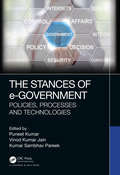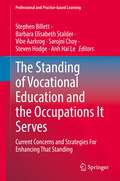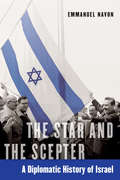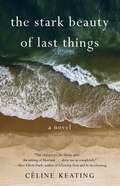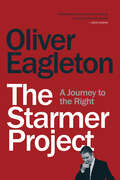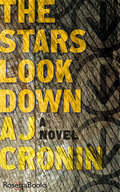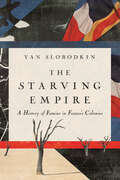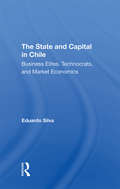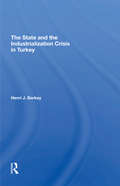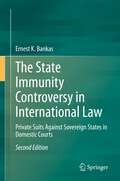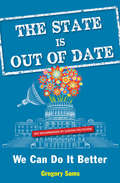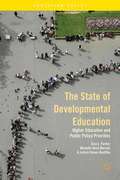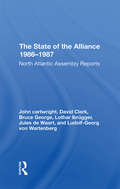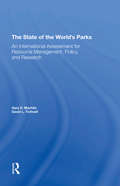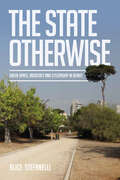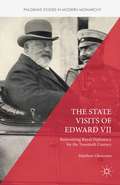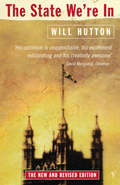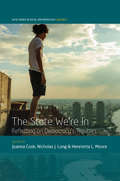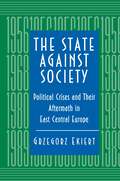- Table View
- List View
The Stances of e-Government: Policies, Processes and Technologies
by Vinod Kumar Jain Puneet Kumar Kumar Sambhav PareekThis book focuses on the three inevitable facets of e-government, namely policies, processes and technologies. The policies discusses the genesis and revitalization of government policies; processes talks about ongoing e-government practices across developing countries; technology reveals the inclusion of novel technologies.
The Standing of Vocational Education and the Occupations It Serves: Current Concerns and Strategies For Enhancing That Standing (Professional and Practice-based Learning #32)
by Stephen Billett Steven Hodge Sarojni Choy Barbara Elisabeth Stalder Vibe Aarkrog Anh Hai LeThis book addresses what is, perhaps, the single most important issue for vocational education; its relatively low standing in an era of high aspiration. The work explores the nature, extent and consequences for an educational sector that whilst having an increasingly important role in contemporary societies is seen to be of low standing across both countries with developed and developing economies. Some of the standing is associated with the occupation it serves and this is highlighted in an era of high aspiration by young people and their parents. The consequences are far-reaching. This includes how governments and community view and support vocational education, parents and familiars advise about participation in it and young people’s decision-making associated with their post-school pathways. More than describing this problem, the focus of this collection is how this issue can be redressed through the actions of supra-government agencies, governments, schools in tertiary education institutions, industry and professional bodies and employers. It sets out the quality and extent of societal sentiments in shaping how vocational education and the occupation it serves are projected, across countries, continents and cultures, and offers a range of perspectives and contributions from scholars on how this issue might be redressed. These contributions are drawn together and synthesised into sets of propositions, practices and approaches directed towards governments, schooling and tertiary education institutions, educators, researchers, industry and professional bodies and employers. In this way, the book seeks to provide an authoritative, seminal, comprehensive and central text to understand and respond to this central issue for vocational education.
The Star and the Scepter: A Diplomatic History of Israel
by Emmanuel NavonThe first all-encompassing book on Israel&’s foreign policy and the diplomatic history of the Jewish people, The Star and the Scepter retraces and explains the interactions of Jews with other nations from the ancient kingdoms of Israel to modernity. Starting with the Hebrew Bible, Emmanuel Navon argues that one cannot grasp Israel&’s interactions with the world without understanding how Judaism&’s founding document has shaped the Jewish psyche. He sheds light on the people of Israel&’s foreign policy through the ages: the ancient kingdoms of Israel, Jewish diasporas in Europe from the Middle Ages to the emancipation, the emerging nineteenth-century Zionist movement, and Zionist diplomacy following World War I and surrounding World War II. Navon elucidates Israel&’s foreign policy from the birth of the state in 1948 to our days: the dilemmas and choices at the beginning of the Cold War; Israel&’s attempts to establish periphery alliances; the Arab-Israeli conflict; Israel&’s relations with Europe, the United States, Russia, Asia, Africa, Latin America, the United Nations, and the Jewish diasporas; and how twenty-first-century energy geopolitics is transforming Israel&’s foreign relations today. Navon&’s analysis is rooted in two central ideas, represented by the Star of David (faith) and the scepter (political power). First, he contends that the interactions of Jews with the world have always been best served by combining faith with pragmatism. Second, Navon shows how the state of Israel owes its diplomatic achievements to national assertiveness and hard power—not only military strength but economic prowess and technological innovation. Demonstrating that diplomacy is a balancing act between ideals and realpolitik, The Star and the Scepter draws aspirational and pragmatic lessons from Israel&’s exceptional diplomatic history.
The Star and the Stripes: A History of the Foreign Policies of American Jews
by Michael N. BarnettHow do American Jews envision their role in the world? Are they tribal—a people whose obligations extend solely to their own? Or are they prophetic—a light unto nations, working to repair the world? The Star and the Stripes is an original, provocative interpretation of the effects of these worldviews on the foreign policy beliefs of American Jews since the nineteenth century. Michael Barnett argues that it all begins with the political identity of American Jews. As Jews, they are committed to their people's survival. As Americans, they identify with, and believe their survival depends on, the American principles of liberalism, religious freedom, and pluralism. This identity and search for inclusion form a political theology of prophetic Judaism that emphasizes the historic mission of Jews to help create a world of peace and justice. The political theology of prophetic Judaism accounts for two enduring features of the foreign policy beliefs of American Jews. They exhibit a cosmopolitan sensibility, advocating on behalf of human rights, humanitarianism, and international law and organizations. They also are suspicious of nationalism—including their own. Contrary to the conventional wisdom that American Jews are natural-born Jewish nationalists, Barnett charts a long history of ambivalence; this ambivalence connects their early rejection of Zionism with the current debate regarding their attachment to Israel. And, Barnett contends, this growing ambivalence also explains the rising popularity of humanitarian and social justice movements among American Jews. Rooted in the understanding of how history shapes a political community's sense of the world, The Star and the Stripes is a bold reading of the past, present, and possible future foreign policies of American Jews.
The Stark Beauty of Last Things: A Novel
by Céline KeatingThe Stark Beauty of Last Things is set in Montauk, the far reaches of the famed Hamptons, an area under looming threat from a warming climate and overdevelopment. Now outsider Clancy, a thirty-six-year-old claims adjuster scarred by his orphan childhood, has inherited an unexpected legacy: the power to decide the fate of Montauk&’s last parcel of undeveloped land.Everyone in town has a stake in the outcome, among them Julienne, an environmentalist and painter fighting to save the landscape that inspires her art; Theresa, a bartender whose trailer park home is jeopardized by coastal erosion; and Molly and Billy, who are struggling to hold onto their property against pressure to sell. When a forest fire breaks out, Clancy comes under suspicion for arson, complicating his efforts to navigate competing agendas for the best uses of the land and to find the healing and home he has always longed for.Told from multiple points of view, The Stark Beauty of Last Things explores our connection to nature—and what we stand to lose when that connection is severed.
The Starmer Project: A Journey to the Right
by Oliver EagletonForensic political biography of the Labour Party leaderHailed as a human-rights champion and political outsider, what sort of politician is Keir Starmer really, and what mark is he making on the new politics of Labour? In The Starmer Project, Oliver Eagleton provides a careful reading of Starmer&’s record at the Crown Prosecution Service and as a member of Jeremy Corbyn&’s shadow cabinet, tracing the political alliances he forged and the roots of his bid for the party leadership. Starmer originally pledged to revitalise Corbynism with a dose of lawyerly competence. To understand what happened afterwards it is necessary to understand the man himself. So little remains known about Starmer that his actions are usually interpreted as overtures to others. On closer inspection, however, he is anything but an empty political vessel.
The Stars Look Down: A Novel
by AJ CroninThis thought-provoking novel of the challenges a coal mining community faces in the early twentieth century is &“the finest work Cronin has given his public&” (Kirkus Reviews). First published in 1935, The Stars Look Down tells the story of a North Country mining town as its inhabitants make their way through social and political upheaval. Digging into workers&’ rights, social change, and the relationship between labor and capitalism, the struggles of the novel&’s trifecta of protagonists—politically minded miner David Fenwick, ambitious drifter Joe Gowlan, and frustrated yet meek mining-baron&’s son Arthur Barras—remain compelling and relevant to readers in the twenty-first century. AJ Cronin&’s tale is one of many of the hardships of coal-mining communities during the industrial pre-war, World War I, and interwar periods in Britain, but stands out for its unflinching prose, universal themes, and keen storytelling. The novel was adapted into a 1940 film starring Michael Redgrave as Davey Fenwick, is a New York Times Critics&’ Pick, and is included in the New York Times Guide to the Best 1,000 Movies Ever Made.
The Starving Empire: A History of Famine in France's Colonies
by Yan SlobodkinThe Starving Empire traces the history of famine in the modern French Empire, showing that hunger is intensely local and sweepingly global, shaped by regional contexts and the transnational interplay of ideas and policies all at once. By integrating food crises in Algeria, West and Equatorial Africa, and Vietnam into a broader story of imperial and transnational care, Yan Slobodkin reveals how the French colonial state and an emerging international community took increasing responsibility for subsistence, but ultimately failed to fulfill this responsibility. Europeans once dismissed colonial famines as acts of god, misfortunes of nature, and the inevitable consequences of backward races living in harsh environments. But as Slobodkin recounts, drawing on archival research from four continents, the twentieth century saw transformations in nutrition, scientific racism, and international humanitarianism that profoundly altered ideas of what colonialism could accomplish. A new confidence in the ability to mitigate hunger, coupled with new norms of moral responsibility, marked a turning point in the French Empire's relationship to colonial subjects—and to nature itself. Increasingly sophisticated understandings of famine as a technical problem subject to state control saddled France with untenable obligations. The Starving Empire not only illustrates how the painful history of colonial famine remains with us in our current understandings of public health, state sovereignty, and international aid, but also seeks to return food—this most basic of human needs—to its central place in the formation of modern political obligation and humanitarian ethics.
The Stasi Files Unveiled: Guilt and Compliance in a Unified Germany
by Barbara MillerIn 1992 the massive files of East Germany's infamous Ministry for State Security, the Stasi, were made publicly available and thousands of former East Germans began to confront their contents. Finally it was possible for ordinary citizens to ascertain who had worked for the Stasi, either on a full-time basis or as an "unofficial employee," the Stasi's term for an informer. The revelations from these documents sparked feuds old and new among a population already struggling through enormous social and political upheaval. Drawing upon the Stasi files and upon interviews with one-time informers, this book examines the impact of the Stasi legacy in united Germany.Barbara Miller examines such aspects of the informer's experience as: the recruitment procedure; daily life and work; motivation and justification. She goes on to consider the dealings of politicians and the courts with the Stasi and its employees. Her analysis then turns to the way in which this aspect of recent German history has been remembered, and the phenomenal impact of the opening of the files on such perceptions of the past.The Stasi Files Unveiled: Guilt and Compliance in a Unified Germany offers important new perspectives on the nature of individual and collective memory and is a fascinating investigation of modern German society.Barbara Miller graduated from the University of Glasgow in 1991 with a degree in German and psychology. She taught and researched in Germany and Austria before completing her doctoral thesis in Glasgow in 1997. She is now based in Sydney, Australia.
The State And Capital In Chile: Business Elites, Technocrats, And Market Economics
by Eduardo SilvaChile emerged from military rule in the 1990s as a leader of free market economic reform and democratic stability, and other countries now look to it for lessons in policy design, sequencing, and timing. Explanations for economic change in Chile generally focus on strong authoritarianism under General Augusto Pinochet and the insulation of policymakers from the influence of social groups, especially business and landowners. In this book Eduardo Silva argues that such a view underplays the role of entrepreneurs and landowners in Chile's neoliberal transformation and, hence, their potential effect on economic reform elsewhere. He shows how shifting coalitions of businesspeople and landowners with varying power resources influenced policy formulation and affected policy outcomes. He then examines the consequences of coalitional shifts for Chile's transition to democracy, arguing that the absence of a multiclass opposition that included captialists facilitated a political transition based on the authoritarian constitution of 1980 and inhibited its alternative. This situation helped to define the current style of consensual politics that, with respect to the question of social equity, has deepened a neoliberal model of welfare statism, rather than advanced a social democratic one.
The State And The Industrialization Crisis In Turkey
by Henri J BarkeyThis book re-evaluates the politics of the maligned industrialization strategy and examines Turkey's attempts to implement it in the 1960s and 1970s. It argues that Import Substituting Industrialization itself is not responsible for the failure of Turkey's industrialization efforts.
The State Courts
by Robert A. Carp Kenneth L. Manning Ronald C. StidhamIn this new adaptation from their classic Judicial Process in America, Carp, Stidham, and Manning provide a comprehensive look at state judicial systems. They place the various state court systems within the overall political and judicial framework and examine recent events in, and policymaking by, state courts.
The State Governor (U.S. Government)
by Martha E. RustadWhat does a state governor do? Learn about the duties of a state governor, who can be a state governor, where they work, and how state governors are elected. Descriptive main text, full-color photos, fast facts, and callout definitions work together to support understanding.
The State Immunity Controversy in International Law: Private Suits Against Sovereign States in Domestic Courts
by Ernest K. BankasThe author shows through a careful analysis of the law that restrictive immunity does not have vox populi in developing countries, and that it lacks usus. He also argues that forum law, i.e. the lex fori is a creature of sovereignty and between equals before the law, only what is understood and acknowledged as law among states must be applied in as much as the international legal system is horizontal.
The State Is Out of Date: We Can Do It Better
by Gregory Sams&“A humorous and at times brutally honest overview on many of the problems . . . that we presently endure through our political and cultural divide.&”—Robert Steven Thomas, author of Intelligent Intervention As disillusioned citizens across the planet take to the streets, do you wonder if the world&’s nation states will ever get it right? Does anyone really think that politics is working—aside from those in power and behind it? What if living together in peace and harmony is a more natural condition than what we experience in today&’s conflict-driven culture? We are community animals with built-in empathy, good at organizing things and helping each other out. The most essential and reliable features of our culture arose without top-down planning by a state that has one basic objective—to stay in power. We have enjoyed enduring civilizations in the past governed wholly from the bottom-up, without need of a shepherd and sheepdogs. We can do it again and are more connected than ever before. The State Is Out of Date reassures us that politics is not even the primary game in town, though it sometimes may seem like the only one. It is a book for all those who wonder why politics isn&’t working and what would. &“A book of immense importance that also happens to be immensely readable. Get it now, read it now. You&’ll be amazed, impressed, persuaded, infuriated and filled with hope for a future that awaits us if only we are prepared to make the right choices.&”—Graham Hancock, New York Times bestselling author of America Before &“Gregory Sams is a prophet of conscience.&”—Lanny Cotler, film writer and director
The State Of Developmental Education
by Tara L. Parker Michelle Sterk Barrett Leticia Tomas BustillosThe State of Developmental Education is the first book to provide a thorough, comparative picture of how developmental education is carried out at higher education institutions and investigate how different state-level policies and priorities change the availability, types, and quality of developmental education available.
The State Of The Alliance 1986-1987: North Atlantic Assembly Reports
by John Cartwright Lothar Ibrugger Jules De Waart Ludolf-Georg Von WartenbergOriginally published in 1987. Leaders of NATO countries are continually faced with the need for highly accurate information on complex issues such as arms control, nuclear strategy, electronic warfare, ABM compliance, SDI, terrorism, economic cooperation, East-West relations, and diverging public opinion. To provide ongoing analysis of these issues, the North Atlantic Assembly conducts extensive research, fact-finding missions, and interviews with high-level government experts. Committees then analyze the data and meet annually to present the results. The studies in this volume, which were presented to the 1986 annual session of NATO legislators, focus on the state of the Alliance. This collection provides a comprehensive evaluation of political developments within the Alliance, probes fundamental controversies underlying Alliance security, and sheds light on the aggregate of concerns surrounding the direction of arms control negotiations and the state of NATO's nuclear strategy. The book includes an appendix containing the policy recommendations that the Assembly has adopted and forwarded to the secretary general of NATO and heads of Alliance governments.
The State Of The World's Parks: An International Assessment For Resource Management, Policy, And Research
by Gary E Machlis David L. TichnellNational parks are a global phenomenon found in more than 120 countries. These parks are as diverse as the physical settings and cultural patterns of the many nations that have established them, yet within each country they serve as part of the cohesiveness that binds people together. Parks reflect-and help create-people's pride and love for their national heritage.
The State Otherwise: Green Space, Citizenship and Advocating for the Public in Beirut
by Alice StefanelliThe city of Beirut is increasingly congested, polluted and suffocating. Its already limited green public spaces are under growing threat of privatisation and redevelopment. The State Otherwise examines the difficult predicament of Beirut’s public green spaces from the vantage point of the civic campaign to reopen Horsh al Sanawbar, the city’s largest public park. Analysing the relationship between neoliberal sectarianism, private interest and political action, the book asks questions about the nature of privatisation of public property, civic society’s potential to mobilise individuals and the role of public authorities in promoting the public good.
The State Visits of Edward VII: Reinventing Royal Diplomacy for the Twentieth Century (Palgrave Studies In Modern Monarchy)
by Matthew GlencrossThe State Visits of Edward VII.
The State Visits of Edward VII: Reinventing Royal Diplomacy for the Twentieth Century (Palgrave Studies in Modern Monarchy)
by Matthew GlencrossThis book explores the revival under Edward VII of the ceremonial state visit by British monarchs, showing the impact and importance of active royal diplomacy during his reign. Using the Royal Archives, memoirs and newspapers, it reveals the contribution made by the use of ceremony and public display to popular appreciation of the monarchy.
The State We're In: (Revised Edition)
by Will HuttonThe number one bestseller on the hardback list for more than six months, The State We're In is the most explosive analysis of British society to have been published for over thirty years. It is now updated for the paperback edition.
The State We're In: Reflecting on Democracy's Troubles (WYSE Series in Social Anthropology #3)
by Nicholas J. Long Joanna Cook Henrietta L. MooreWhat makes people lose faith in democratic statecraft? The question seems an urgent one. In the first decades of the twenty-first century, citizens across the world have grown increasingly disillusioned with what was once a cherished ideal. Setting out an original theoretical model that explores the relations between democracy, subjectivity and sociality, and exploring its relevance to countries ranging from Kenya to Peru, The State We're In is a must-read for all political theorists, scholars of democracy, and readers concerned for the future of the democratic ideal.
The State We're In: Washington
by Jill SevernThis book describes the structure and function of government as well as how our democratic government was created, why we should care about it and how citizens can participate. The way tribes governed themselves pre-contact and the intricate interrelationships between state, tribal and local government are included. How a bill becomes a law, how money is collected and spent, the workings of the judicial system and state agencies, etc. are also an important part of this book.
The State against Society: Political Crises and Their Aftermath in East Central Europe
by Grzegorz EkiertClassical images of state-socialism developed in contemporary social sciences were founded on simple presuppositions. State-socialist regimes were considered to be politically stable due to their pervasive institutional and ideological control over the everyday lives of their citizens, impervious to reform and change, and representative of extreme political and economic dependency. Despite their contrasting historical experiences, they have been treated as basically identical in their institutional design, social and economic structures, and policies. Grzegorz Ekiert challenges this notion in a comparative analysis of the major political crises in post-1945 East Central Europe: Hungary (1956-63), Czechoslovakia (1968-76), and Poland (1980-89). The author maintains that the nature and consequences of these crises can better explain the distinctive experiences of East Central European countries under communist rule than can the formal characteristics of their political and economic systems or their politically dependent status. He explores how political crises reshaped party-state institutions, redefined relations between party and state institutions, altered the relationship between the state and various groups and organizations within society, and modified the political practices of these regimes. He shows how these events transformed cultural categories, produced collective memories, and imposed long-lasting constraints on mass political behavior and the policy choices of ruling elites. These crises shaped the political evolution of the region, produced important cross-national differences among state-socialist regimes, and contributed to the distinctive patterns of their collapse.
